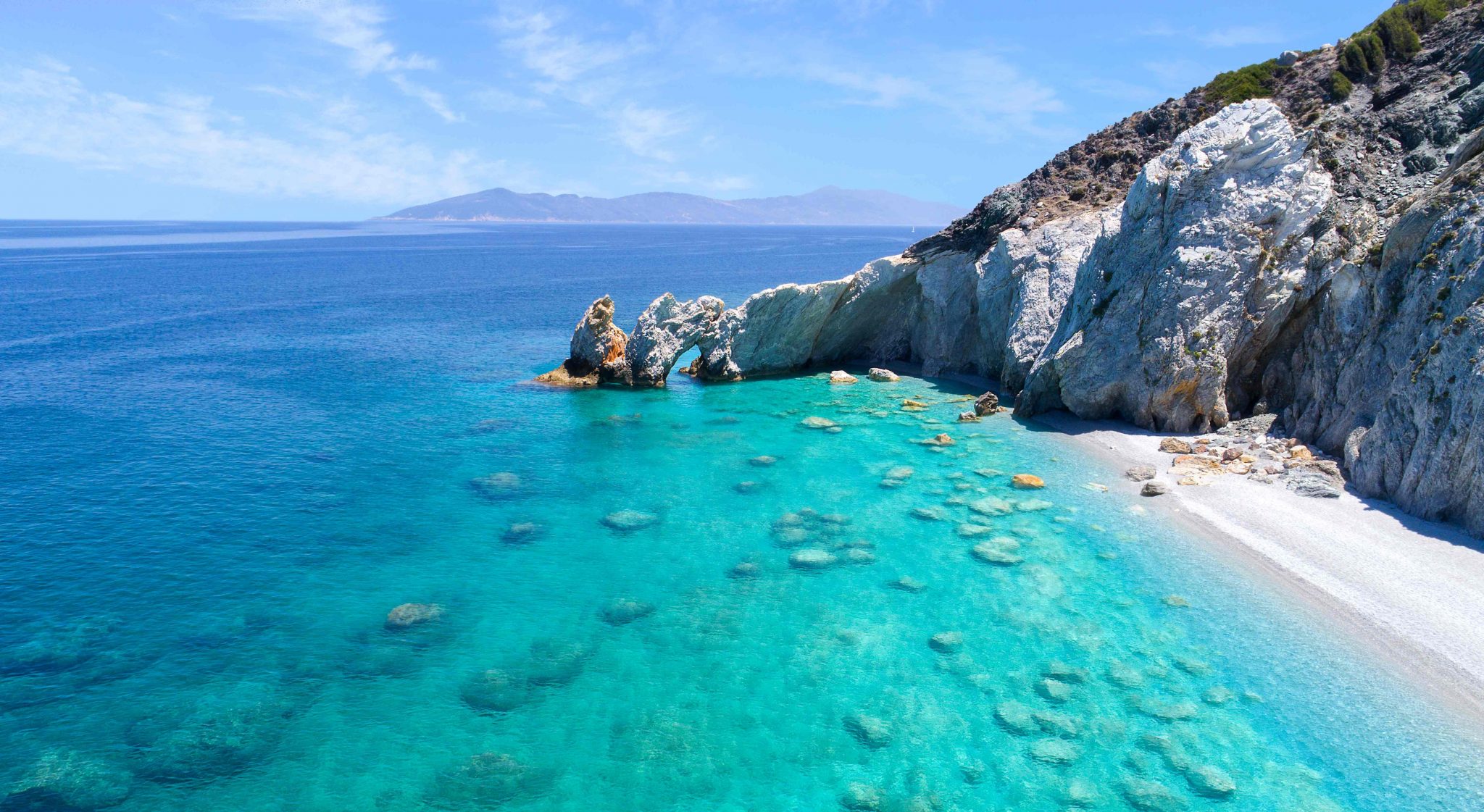
Pebbles, sand, and shells bathed in Mediterranean sunlight—that’s the image ‘Greek summer’ conjures up for many. But with more and more tourists spiriting “keepsakes” away from Greece’s most popular beaches, the reality may not match the image for much longer. Maybe because they can’t take the glorious Greek light back home, visitors settle for more tangible souvenirs: the wave-carved pebbles, glistening sands and intricate shells that adorn our coastline. But this new fad comes at a heavy price for the landscapes these super-fans of the Greek summer are so keen to remember.
There are many examples of landscapes in Greece and abroad being ‘mutilated in this way, and local authorities around the Med are sounding the alarm. Needless to say, some have spotted a business opportunity in other people’s irresponsible attitude toward the natural landscape. Which is how online shopping platforms now feature ads for jars of sand from Crete, Skiathos, Corfu and Mykonos. It’s amazing what some people will do to make a dishonest buck. 
Elafonissi and Balos
The pink sand of Elafonissi and Balos, two famous beaches in the prefecture of Chania on Crete, is a perfect example, since their singular color scheme is a key factor in their popularity. Indeed, some travel agencies recommend Chania as an ideal destination purely on the basis of the “pink beach” experience. And yet, without effective monitoring and enforcement of the law prohibiting acts that alter the natural landscape, isolated cases of souvenirs being taken away from the beaches in jars, bottles and even plastic bags has quickly snowballed into a full-blown scourge. In fact, environmental organizations are now warning that both emblematic beaches face an uncertain future. Speaking to TA NEA, Nektarios Perrakis, the chairman of the Municipal Enterprise that manages the area that includes Elafonissi beach, said: “Now that the phenomenon has got out of control, we have six people supervising the beach whose job is almost exclusively preventing incidents of sand theft.”
He goes on to add that, even though the beach now need protection year-round from an ever-growing number of attempted removals, the majority are foiled by the authorities. “The pink sand at Elafonissi is world famous and there are many people who want to take some home with them when they leave, without realizing that this could end up ruining the very thing they came here to admire. Needless to say, their actions are nothing short of disastrous for an area that is part of the EU’s Natura Protected Areas Network.”
Lalaria beach
The situation is very similar in one of Greece’s most cosmopolitan destinations: Skiathos. Situated on the island’s northern coast, Lalaria beach is consistently ranked among the 50 best in the world. There, the visitor can admire the famous perfectly round white pebbles (the name of the beach comes from the ancient Greek word ‘las’, meaning ‘stone’), which are only found in this area. Over the years, however, visitors have acquired the bad habit of taking pebbles away with them as souvenirs, putting the beach’s unique nature and appearance at risk.
In an effort to mitigate the damage, it was decided a decade ago to strictly prohibit the removal of the unique pebbles. So when the “Skiathos” Cultural Association proposed in 2014 that the authorities introduce special measures to protect the beach, the local port authority proposed a directive banning the collection of pebbles. This was subsequently adopted, introducing fines for offenders ranging from €300 to €1,000 depending on the circumstances.
As the mayor of Skiathos, Theodoros Tzoumas, stressed to TA NEA, the phenomenon had acquired alarming dimensions, with pebbles being removed in ever greater numbers from the beach. “We put up signs warning that doing so was illegal and could be prosecuted, and the Coast Guard also carried out regular inspections. And as Lalaria is only accessible from the sea, the captains of the boats that ferry holidaymakers to and from the beach were also told to keep an eye out for passengers taking pebbles away with them.”
At the same time, the mayor tells us, a special container was installed at Skiathos airport to give tourists a last chance to return any pebbles they may have taken. This proved to be the most effective measure of all: “People get worried their luggage will be checked and rush to dump their contraband. When the bin fills up, the airport staff give us a call and we return the “stolen goods” to the beach aboard a Coast Guard vessel.”
To enhance the effectiveness of all the above, the Skiathos authorities have also initiated an awareness-raising campaign, placing signs at busy spots on the island, on boats and other forms of public transport encouraging visitors to “Take a picture not a pebble—Save Lalaria beach.” Tourists need to know that nature cannot replenish the pebbles at the speed they’re being removed.
Treasures for sale
Nonetheless, a simple Internet search reveals that Greece’s natural treasures are not only up for sale, they are also very popular with online purchasers. In fact, quite a few people put illegal goods up for sale—humble sand and pebbles from some Greek beach or other—on well-known websites, reaping significant financial rewards in the process.
Indicatively, jars of sand from the beaches of Issos and Arkoudilas on Corfu, pebbles from Kavala, and even sand from Mykonos are all available for purchase on the Internet, the latter at a price which reflects the glamour it will bring to the room it ends up adorning.
Prices for the above vary depending on quantity and origin, starting at 2.99 euros and rising as high as 40 euros per jar. Sources at the Ministry of Environment and Energy confirm that such transactions are illegal.
Source: tovima.com
Latest News

Airbnb Greece – Initial CoS Ruling Deems Tax Circular Unlawful
The case reached the Council of State following annulment applications filed by the Panhellenic Federation of Property Owners (POMIDA)

Mitsotakis Unveils €1 Billion Plan for Housing, Pensioners, Public investments
Greek Prime Minister Kyriakos Mitsotakis has announced a new set of economic support measures, worth 1 billion euros, aiming to provide financial relief to citizens.

Alter Ego Ventures Invests in Pioneering Gaming Company ‘Couch Heroes’
Alter Ego Ventures' participation in the share capital of Couch Heroes marks yet another investment by the Alter Ego Media Group in innovative companies with a focus on technology.

Corruption Still Plagues Greece’s Driving Tests
While traffic accidents continue to claim lives on Greek roads daily, irregularities and under-the-table dealings in the training and testing of new drivers remain disturbingly widespread

Pope Francis Died of Stroke and Heart Failure Vatican Confirms
As news of the official cause of death spread, tributes poured in from across the globe. The 1.4 billion-member Catholic Church is united in grief, remembering a pope who championed inclusion, justice, and compassion

Increase in Both Museum Visits, Revenues for 2024
As expected, the Acropolis was the top archeological site in the country, followed by Sounion, Mycenae, the ancient theater of Epidaurus, and Vergina in northern Greece

Where Greece’s Tourists Come From: A Look at 2025’s Top Visitor Markets
The United Kingdom continues to hold the top spot as the largest source of incoming tourism, with 5.6 million seats booked for Greece this summer — up 2.2% from last year. This accounts for 20% of all international air traffic to Greece

Pope Francis: A Pontiff Who Reshaped the Papacy and Sparked a Global Conversation
His first words from the balcony of St. Peter’s Basilica—“Brothers and sisters, good evening”—set the tone for a pontificate that would challenge norms, favor mercy over dogma, and bring the papacy closer to the people.

When Blue Skies was Unmasked as ND’s Political ‘Slush Fund’
The fact that so many top New Democracy (ND) party cadres were paid by the firm Blue Skies, owned by Thomas Varvitsiotis and Yiannis Olympios, without ever citing this publicly, raises very serious moral issues, regardless of the legality

Greek Women’s Water Polo Team Top in the World after 13-9 Win Over Hungary
The Greek team had previously defeated another tournament favorite, the Netherlands, to reach the final.











![Πλημμύρες: Σημειώθηκαν σε επίπεδα ρεκόρ στην Ευρώπη το 2024 [γράφημα]](https://www.ot.gr/wp-content/uploads/2025/04/FLOOD_HUNGRY-90x90.jpg)




![Ξενοδοχεία: Μεγάλο το ενδιαφέρον για επενδύσεις στην Ελλάδα – Η θέση της Αθήνας [γραφήματα]](https://www.ot.gr/wp-content/uploads/2025/03/Athens-hotels-90x90.jpg)
























 Αριθμός Πιστοποίησης
Αριθμός Πιστοποίησης